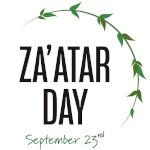Za’atar Day Date in the current year: September 23, 2026
 Za’atar Day, also known as International Za’atar Day and World Za’atar Day, is observed annually on September 23. It celebrates a culinary herb that is widely used in Middle Eastern cuisine, as well as the spice mix of the same name, which is based on the herb.
Za’atar Day, also known as International Za’atar Day and World Za’atar Day, is observed annually on September 23. It celebrates a culinary herb that is widely used in Middle Eastern cuisine, as well as the spice mix of the same name, which is based on the herb.The word za’atar (pronounced zah-tar) can have several meanings. In its most basic meaning, it refers to Origanum syracium, a Middle Eastern plant in the Lamiaceae family that is commonly known as bible hyssop, Lebanese oregano, or Syrian oregano. It is believed that the ezov plant mentioned in the Old Testament is in fact za’atar, although in many translations of the Bible ezov is interpreted as hyssop.
In a wider sense, the name za’atar may refer to other Middle Eastern culinary herbs that belong to other genera of the same family, such as oregano, marjoram, basil thyme, thyme, and savory. Finally, za’atar is also the name of a spice mixture of which the za’atar is the main ingredient.
The za’atar spice blend is usually made with ground za’atar mixed with salt, toasted sesame seeds, and sumac berries. In areas where Lebanese oregano is not available, other plants from the Lamiaceae family (the ones we mentioned above) may be used in its place. There are many variations of za’atar that contain various additional ingredients such as caraway, coriander, cumin, and fennel seeds.
Za’atar, both the herb and the spice blend, is popular in the Levant region, which includes present-day Egypt, Iraq, Israel, Jordan, Lebanon, Palestine, Syria, Tunisia, and Turkey. It is also popular in Algeria, Armenia, Kuwait, Libya, Morocco, Oman, and Saudi Arabia.
Za’atar is traditionally eaten with pita (yeast-leavened flatbread), which is dipped in olive oil and then za’atar. It may also be mixed with olive oil to make a paste that is spread on a dough base, which is then baked in the oven to make manakish bi za’atar (za’atar bread). In addition, za’atar can be sprinkled onto hummus and baba ghanoush, added to salad dressings, and used to season roasted and sautéed vegetables, meats, fish, and labneh (strained yogurt). In Oman, the za’atar plant is used to make a herbal tea.
Since many ingredients in the za’atar spice blend have antioxidant and anti-inflammatory properties, some women use za’atar in DIY skincare products. The easiest way to use za’atar in skincare is to mix it with some water to make a paste, which you can use as a face mask.
Za’atar Day is promoted by Your Lebanon, a project dedicated to Lebanese and Middle Eastern cuisine that is run by a community of chefs and bakers. The holiday aims to celebrate this delicious and versatile culinary herb and spice blend, and to encourage people to give it a try.
You can celebrate Za’atar Day by learning more about za’atar, its health benefits and culinary uses, cooking with za’atar (you can add the spice blend to one your favorite dishes or try a new recipe from Middle Eastern cuisine), making your own za’atar blend, and spreading the word about this amazing holiday on social media with the hashtag #ZaatarDay.
- Category
- Unofficial Holidays
- Tags
- Za’atar Day, unofficial holidays, Middle Eastern cuisine, International Za’atar Day, World Za’atar Day